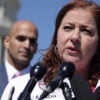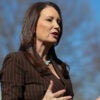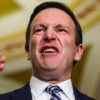
Following billion dollar bailouts and stimulus packages, the Administration is hoping to find “savings” elsewhere in the federal budget. One of its targets is defense. According to Defense Secretary Robert Gates, the “gusher” of defense spending “has been turned off, and will stay off for a good period of time.”
His effort is misguided. It’s a political decision divorced from the reality of the threats we face. And it’s not a move Americans support. According to a new NBC News-Wall Street Journal poll, cutting defense is as unpopular as raising payroll taxes to fund Medicare. A solid 57 percent of adults say it would be “unacceptable” to reduce spending on national security and defense weapons systems.
The Daily Signal depends on the support of readers like you. Donate now
The problem with restraining the defense budget further is that it is already near historic lows—and an unprecedented level for the nation in wartime. During the Cold War, defense spending averaged 7.8 percent of gross domestic product (GDP). The Administration’s current budget projections show total defense spending falling from 4.9 percent today to 3.6 percent of GDP by 2015. In the words of the Quadrennial Defense Review Independent Panel, thanks to aging equipment; escalating personnel, overhead, and procurement costs; and increasing operational demands, the U.S. military is heading for a “train wreck” in personnel, acquisition, and force structure.
Defense is not the culprit of our budget woes, and it shouldn’t bear the brunt of the Obama Administration’s efforts to look fiscally responsible. This year, defense accounts for 19 percent of all federal spending, compared with 57 percent for our entitlement programs. As entitlement costs grow, there will be less and less left over for anything, including defense.
Americans are sensible people. They care greatly about security, not just for this generation but for generations to come. This new poll shows that Americans are far more willing to underwrite the costs of defense than our leaders understand. Let’s hope Washington is listening and, as the QDR review panel recommends, finds the political will to fund the kind of military forces our nation—and the world—expect.





























